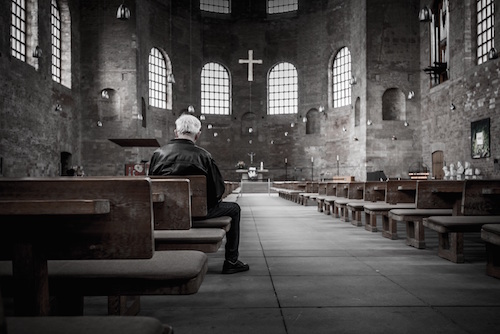We run our website the way we wished the whole internet worked: we provide high quality original content with no ads. We are funded solely by your direct support. Please consider supporting this project.

The Cruciform Trinity
As paradoxical as it sounds, if God is supremely revealed when he stoops to the infinite extremity of becoming his own antithesis on the cross, then we must conclude that stooping to this extremity out of love must, in some sense, be intrinsic to who God eternally is. And rendering this coherent necessitates that we understand God’s revelation on the cross in Trinitarian terms.
The orthodox doctrine of the Trinity states that from all eternity, and apart from any relationship with others outside himself, God’s exists as three Divine Persons who fully pour themselves out for one another and who fully dwell within one another in perfect love. In my opinion, this pouring out and mutual indwelling was best expressed in the Cappadocion doctrine of the “perichoresis” of the three Persons and, with von Balthazar and Moltmann, I understand the eternal act of each divine Person completely giving themselves to the others in love to entail a sort of self-emptying (kenosis) in the very essence of God. (See J. Moltmann, The Trinity and the Kingdom: The Doctrine of God, 58-60, 118-9; von Balthasar, Love Alone, 86-9.) Indeed, if the self-emptying of God to become a human and to die on the cross (Phil 2:6) reveals God’s eternal nature, there must be something corresponding to this self-emptying within the eternal Godhead.
This means that, when the Son emptied himself to identify fully with our limited humanity, our sin, and our God-forsakeness, he was not doing something that was alien to God’s eternal nature. Rather, as Bauckham puts it, “[i]n this act of self-giving God is most truly himself and defines himself for the world.” The perfect, humble, other-oriented love that is displayed in the self-emptying of the Incarnation and Crucifixion, considered as one revelatory act, reveals God precisely because it reflects what God is like within himself and throughout eternity. Torrance argues that, “the atoning act perfected in the cross of Jesus Christ is grounded in the very being of the eternal God, that is, in the eternal being of the Holy Trinity.”
We can, in fact, take this a step further by noting that, in pouring himself out to the point of experiencing his own antithesis, God was not only not doing something that was not alien to himself: he was rather enveloping humans into the same pouring out and mutual indwelling of the three divine Persons that constitutes his eternal essence. And this incorporation is how God makes his eternal nature known to us and how he thereby saves us. We are not only made beneficiaries of God’s self-giving love; we are made “participants of the divine nature” (2 Pet 1:4). By being placed “in Christ” (e.g., Eph 1:3-9) we are by grace becoming participants in the loving oneness of the Father and Son (Jn 17:21-3). Hence, in Christ we are loved by the Father with the same perfect love the Father has for his Son (Jn 17:26; Eph 1:6) and (what comes to the same thing) we are given the same “glory” the Father gives to Jesus (Jn 17:24).
When the Son stooped to the infinite extremity of identifying with our sin and experiencing our God-forsakenness, he was manifesting, and incorporating us into, the perfect, loving holiness and unity that he eternally enjoys with the Father and Spirit. He became our wrong-relatedness to God (sin) in order to incorporate us into his eternal right-relatedness with God (righteousness, 2 Cor 5:21). Hence, we must conclude that the triune God reveals who he truly is, and allows humans to participate in who he truly is, precisely when God, out of love, stoops to becoming his own antithesis. And this is why God’s unsurpassable accommodation of our limitations and sin on Calvary constitutes the ultimate revelation of the triune God. The Trinity is thus not only the presupposition of the intelligibility of God’s revelation on the cross; it is also the content of what is revealed and shared with us on the cross.
Image by Stefan Kunze
Category: General
Tags: Character of God, Crucifixion, Jesus, Kenosis, Love, Trinity
Topics: Trinity
Related Reading

Why Didn’t Jesus Denounce Military Service?
A common objection to the claim that Jesus and the authors of the New Testament were opposed to all forms of violence is that neither Jesus nor anyone else speaks out against it. When soldiers asked John the Baptist what they should do in response to his message, for example, he told them not to…

Loving a Twilight Zone God?
David D. Flowers posted this insightful reflection over on his blog about an episode of The Twilight Zone and what it says about some pop views of God. Can we really love a God that exercises this kind of random control just because he can? We can certainly fear a God like this, but can…

Was Jesus Violent in the Temple?
Many adopt the attitude depicted in the picture above, saying that Jesus used violence when he cleansed the temple. But Jesus’ stance on nonviolence is clear not only from how he responded to threatening enemies at the end of his life; it’s also strongly emphasized his teachings. We need to understand what Jesus was up…

Radical is in the Eye of the Beholder
Josias Hansen is a Brazilian-born, Charismatic Mennonite student at Luther Seminary in St. Paul, MN. Together with Third Way Church, Josias enjoys experimenting with what it looks like to take Jesus seriously as a jolly community of kingdom disciples. Was Jesus a radical? Did he do and teach radical things? What if I were to tell…

Isn’t the Gospel of John unreliable compared to the Synoptic Gospels?
Question: The Jesus Legend persuaded me that the Gospels are generally reliable. But I remain very skeptical of the reliability of the Gospel of John. It was written long after the Synoptics, and its view of Jesus barely resembles that of the Synoptics. The main reason this skepticism of John’s Gospel is significant is that…

Predestination Part 2: Seeing Destiny Rightly
For Part 1, click here. In Ephesians Paul teaches that God “chose us in [Christ] before the creation of the world to be holy and blameless in his sight” (Eph 1:4). In Christ, Paul continues, God “predestined us for adoption to sonship…to the praise of his glorious grace, which he has freely given us in…
